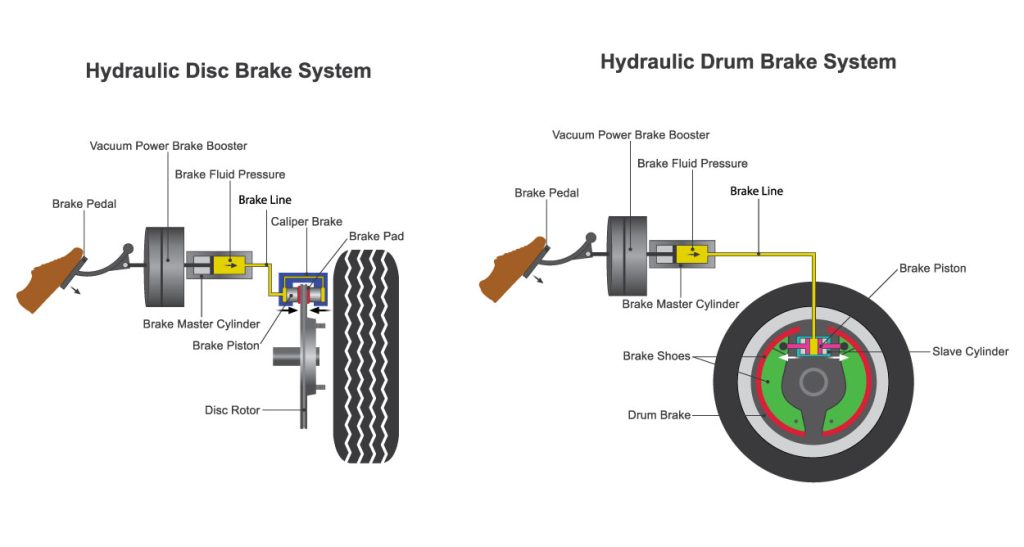Importance of Brakes and Brake Maintenance
Many vehicle owners take for granted the complexity of their vehicle’s braking system and the importance of proper maintenance. The braking system in your car is one of its most critical safety elements, as the capacity to stop or slow down in a fraction of a second is the key to preventing accidents. In this guide we’ll investigate brake maintenance and repairs and why they are important.
How Brakes Work
Brakes may appear simple, but your car’s braking system is quite sophisticated! Kinetic energy, or motion energy, is abundant in a moving car. To stop your car from moving, your braking system converts kinetic energy to heat through friction.
So how would you get enough friction on your brake pads to keep the wheels from spinning? When you press the brake pedal, a lever pushes a piston within a master brake cylinder filled with brake fluid. This brake fluid is forced through brake lines that link to cylinders on all four wheels. A piston in this cylinder will engage your car’s brake pads, which will engage your rotor, generating the friction required to stop your vehicle.
The hydraulic system multiplies the small force you apply to your brake pedal into the ability to stop a 5,000+ pound vehicle! As the brakes create friction on rotors, a massive amount of heat is generated – upward of 500 degrees Celsius; therefore, brake pads must be made of a special heat-resistant material. It is important to note that brake pads are susceptible to breaking down over time.
Passenger vehicles typically use disc or drum brakes, as illustrated below.

Brake Pads
Brake pad replacement is the most common brake maintenance performed. Your brake pads take the brunt of the friction and subsequent heat when stopping your vehicle. Over time, your brake pads will wear away and you’ll begin to feel/hear the signs on worn brake pads. This includes a loud screech or grinding noise when you apply your brakes, and you’ll begin to feel your brake pedal needs to be pushed much harder to stop your vehicle.
Your brake pads need to be replaced every 15,000 to 30,000 km – but this number is not set in stone. Your brake pads are similar to your tire tread in that you’ll generally need to replace them at a specific wear level – for brake pads this is when they reach 8-12mm thickness.
The life of brake pads depends on the manufacturer, the type of vehicle, your climate, and driving style.
Rotors
The rotors on the brakes are one of the most obvious components of the entire brake system. They’re the metal discs fashioned like a flying saucer that are visible behind the hub cap on the wheel hubs. When brake pads are forced against a rotor, heat and gases are produced. It is not uncommon for rotors to become damaged or warped, and in this case, your brake pads may not make optimal contact to slow you down. Brake rotors typically last much longer than brake pads but are still susceptible to damage. If your brake pads become overly worn and lose the pad material, you will begin to damage your rotors by causing metal to metal contact.
Keep an eye on your rotors and look for any cracks, large scratches, or irregularities. Often brake rotors can be machined/resurfaced rather than replaced if issues are caught early enough.
RELATED RESOURCES:
Brake Fluid and Lines
Your brake fluid is the crucial hydraulic fluid that converts the downward push of the pedal to the brake piston and stops your vehicle. Brake fluid lives in a sealed system and can last a long time; however, moisture and air can work its way into your brake lines. Your brake lines are also susceptible to damage that can cause leaking brake fluid, both major leaks which are more noticeable and smaller pin-hole sized leaks. It is critical to have your brake lines and brake fluid inspected regularly. Your mechanic will typically check this on every oil change, but it doesn’t hurt to ask!
Your brake fluid should also be flushed when needed. During this process, your mechanic will flush all brake fluid from your system and replace it with fresh fluid. The recommended intervals for changing brake fluid are not set in stone – intervals can range from every two years, to every 40,000km, or only when needed. This will depend on your manufacturer’s suggestions, your warranty requirements, and your mechanic’s advice.
Don’t Wait
All vehicle maintenance and repairs are important, but your brakes are especially critical. Any irregularities should be inspected by your local Integra Tire immediately, as a brake failure can lead to life-threatening accidents.
A summary of the signs to look out for include:
- Noises including squeals, screeches, and grinding when braking
- A “shaking” sensation in the vehicle or brake pedal
- Having to press the brake pedal much harder than normal when braking
